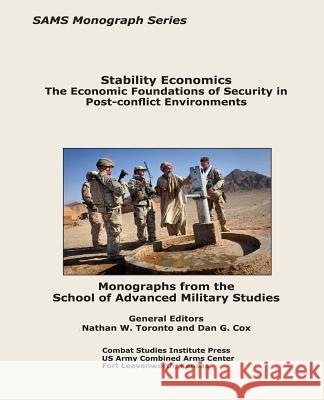Stability Economics: The Economic Foundations of Security in Post-conflict Environments » książka
Stability Economics: The Economic Foundations of Security in Post-conflict Environments
ISBN-13: 9781494445430 / Angielski / Miękka / 2013 / 264 str.
Stability Economics: The Economic Foundations of Security in Post-conflict Environments
ISBN-13: 9781494445430 / Angielski / Miękka / 2013 / 264 str.
(netto: 75,98 VAT: 5%)
Najniższa cena z 30 dni: 79,56
ok. 16-18 dni roboczych
Dostawa w 2026 r.
Darmowa dostawa!
In the years after invading Iraq and Afghanistan, the US military realized that it had a problem: How does a military force set the economic conditions for security success? This problem was certainly not novel-the military had confronted it before in such diverse locations as Grenada, Haiti, Bosnia, and Kosovo. The scale and complexity of the problem, however, were unlike anything military planners had confronted beforehand. This was especially the case in Iraq, where some commentators expected oil production to drive reconstruction. When the fragile state of Iraq's infrastructure and a rapidly deteriorating security situation prevented this from happening, the problem became even more vexing: Should a military force focus on security first, or the economy? How can it do both? This is the challenge of Stability Economics. This volume on Stability Economics begins to fill the gap that expeditionary economics did not: the operational details. What is the theoretical relationship between economics and security? What strategic, political, and environmental contexts do military planners need to consider in order to write economic development lines of effort into operations? At what point do economic development efforts pass from being necessary to achieve the security mission to being humanitarian aid mission creep? Stability Economics also puts the CERP effectiveness and force structure debates into their proper operational context. With respect to CERP effectiveness and money as a weapon system, Stability Economics recognizes that setting the economic conditions for security success entails more than targeting money effectively; it also entails a thorough appreciation of the social, political, and geographic conditions of the fight in which a military unit is engaged. In fact, armed with a robust theory of how economies grow in turbulent post-conflict environments, commanders could recognize that there are times when it is actually better to not spend money. By broadening the theoretical aperture, Stability Economics gives commanders and planners the perspective they need set the economic conditions for security success. It is about more than spending money. It is about understanding the unique characteristics of post-conflict economies.
Zawartość książki może nie spełniać oczekiwań – reklamacje nie obejmują treści, która mogła nie być redakcyjnie ani merytorycznie opracowana.











